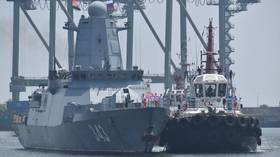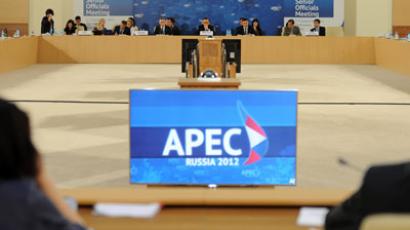‘Slowly but surely, China has been winning its rivalry with Japan'
China has a serious financial and geo-political rivalry with Japan, says founder and CEO of financial analysis firm SGH Macro Advisors, Sassan Ghahramani.
Beijing feels it’s winning the rivalry and is ready to extend its influence into the southern part of the Asian hemisphere, he said amidst the ongoing APEC summit. Ghahramani spoke with RT about China’s relationship with Tokyo and Moscow.RT: Russia wants a free trade zone in the Asia-Pacific. Which countries would benefit from this? Would some countries lose out?Sassan Ghahramani: I think in the Asia Pacific zone, one of the biggest competitors to China that has been rising is Vietnam – both on a trade basis and a geopolitical strategic basis. I think this is a rivalry that China is focused on. Obviously Vietnam is a much smaller country and small economy but it’s really taken the place of some of the cheap labor and low cost producer side of things. And so, the more this trade opens up, the more it could help China and to some expense, at the expense of Vietnam, which has been taking market share away from China.RT: Is there an element where Beijing doesn’t want to be threatened by any other partners in the region, and really want to retain dominance there?SG: Absolutely and you know, traditionally, that rivalry has been most prominent with Japan, but quite frankly China has been winning that war, slowly but surely. The main focus in my industry – in the financial analysis business – the main focus and areas of coverage for us are the US, Europe, and China. And Japan has almost become an afterthought in the financial markets. So both on a financial side and a geo-political strategic side, there’s still a big rivalry with Japan. But I think China feels that basically it’s winning that battle. And now it’s looking to extend its influence into the southern part of the Asian hemisphere and this is what’s sparking clash and conflict with the US.RT: Are we seeing a partnership developing between Russia and China where both will benefit and have as much influence as they want to achieve, by excluding the US in the region?SG: Absolutely. The ties between Putin and Hu Jintao have been extremely strong and that has been at the expense of relations with the US. Not overtly obviously, but when it comes to issues like Syria and Iran, there’s a great deal of coordination between the two sides on those political issues. And this spills over to the economic side, as well – like when we’re talking about how both countries handle the oil embargo the US has been pushing on Iran. Russia as a producer and China as a consumer – the fact that they’re harmonizing on this really helps to counteract US influence and the ability to which the US can exert on its European allies and in Asia and Japan specifically.RT: Vladimir Putin says Russia is ready to ensure greater energy security – are the country's partners not happy with the current state of affairs?SG: There have been tensions between Russia and Europe over energy security in the past. I’m not sure they’re quite as high as they were before. We sort of passed the peak of that with the gas crisis through the Ukraine but those relationships are still strained. There’s issues in the Ukraine, and with Belarus as well. So the deepening of the ties here are toward the east and Russia and China have been developing a great deal of commerce and partnership on the energy side and looking at greater investments in pipelines. China doesn’t want to be dependent on Russia and has been looking at Middle Eastern sources of oil, picking up a lot from Saudi Arabia and Iran. Saudi has shifted a lot of their sales toward China – which used to be toward the US. The energy relationship is strong and growing between Russia and China.RT: In some way, is Russia turning east to bolster its own economy? Is Beijing the way forward now?SG: There is a caveat in that obviously the Chinese economy itself has been slowing, and slowing more than the leadership expected. Initial estimates said they wanted to get something in the area of 8 per cent. Target growth area is now looking something like 7 per cent with the possibility that we could go a little bit lower than that. So the extent that a lot of the region was looking at China as an alternative engine of economic growth, that’s still there, but that’s lessened a little bit. And that’s also lessened some of the political clout of Hu Jintao and Wen Jibao – who are now sort of lame ducks in China. Everyone is looking toward the new leadership, which will be focused on new relationships but will also put a renewed focus on exerting Chinese military and political influence to a more aggressive level than the current leadership has been focused on.














